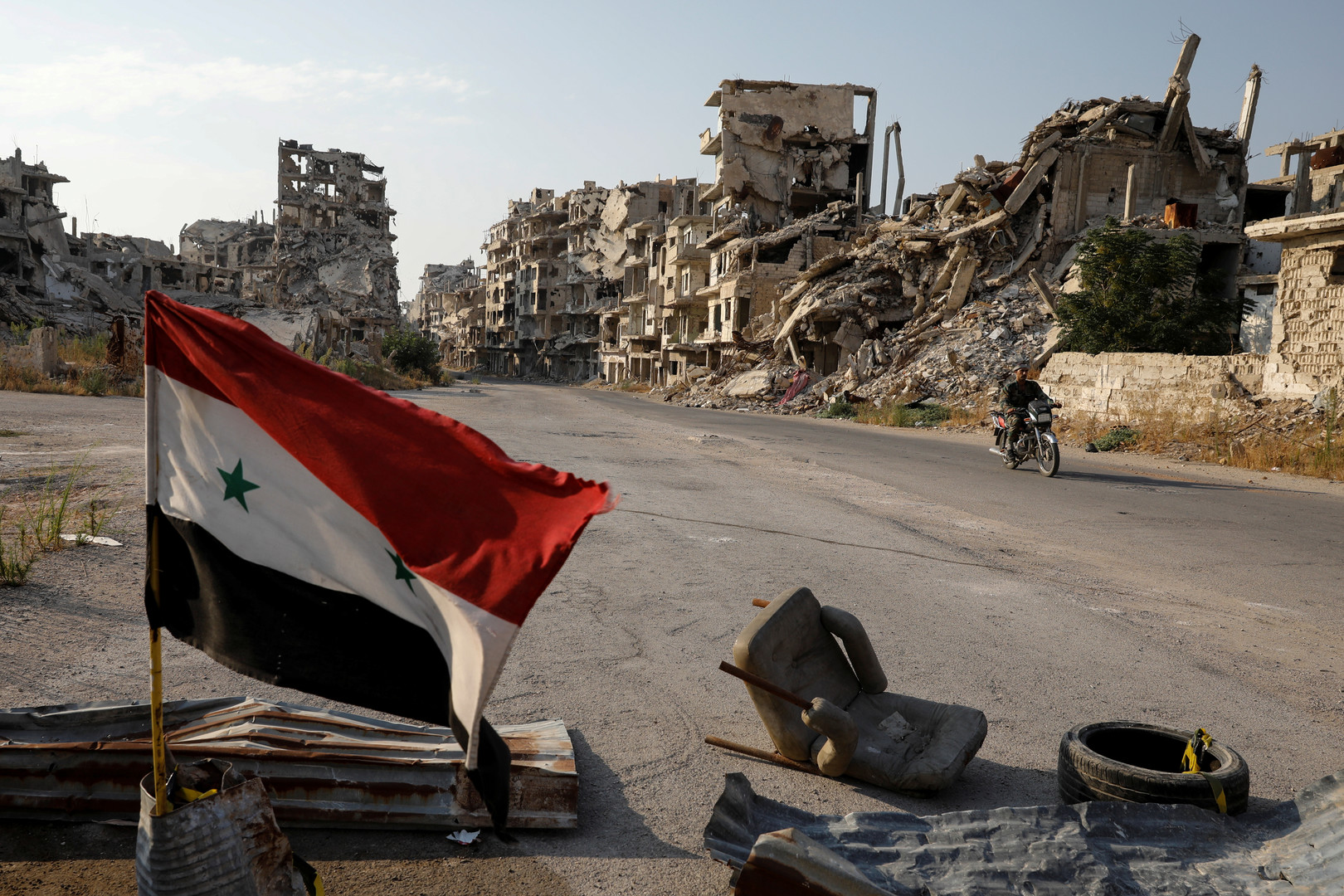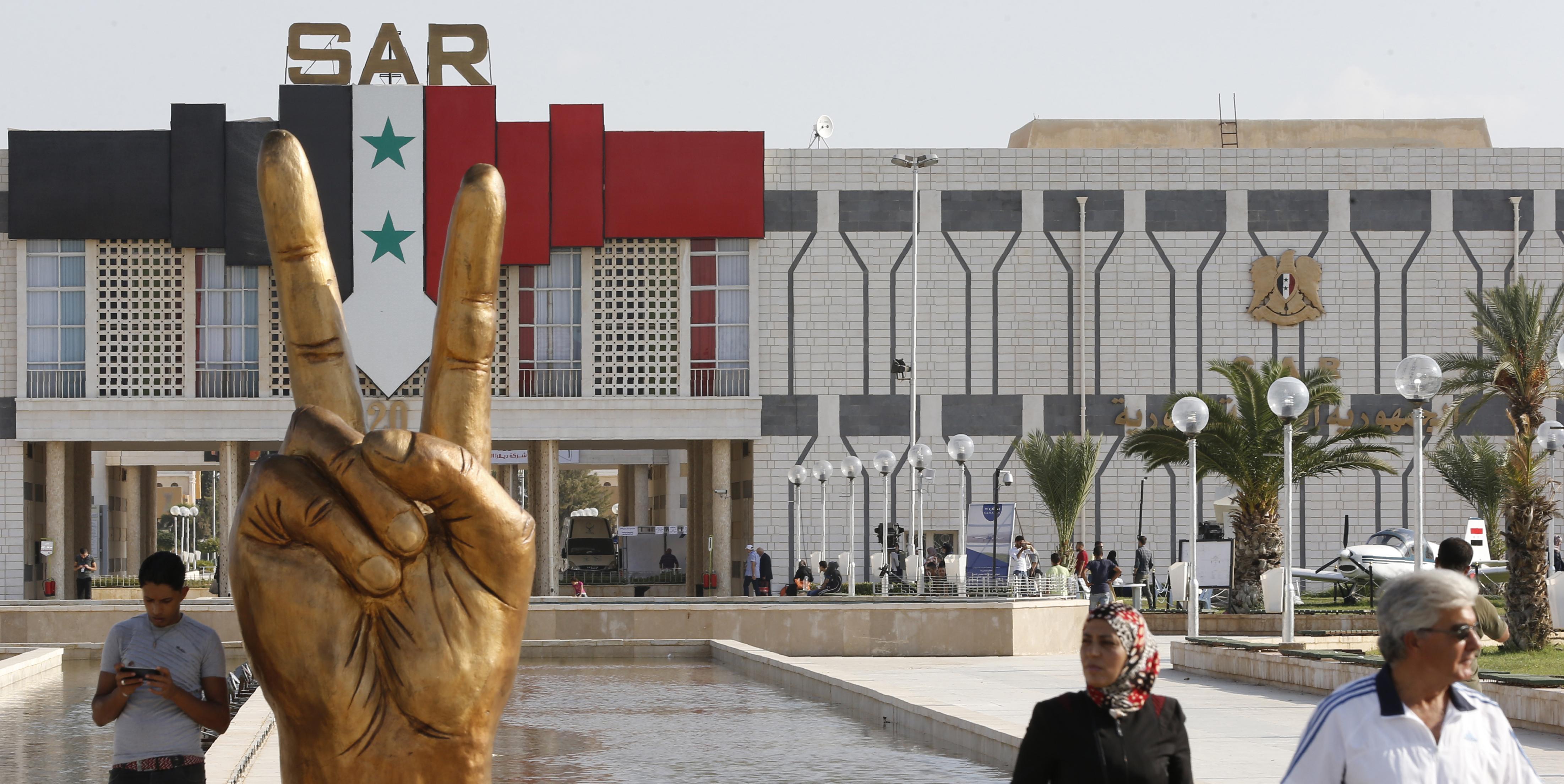As hostilities in Syria draw to a close and a resolution of its prolonged conflict seems to be within reach at last, conversations about Damascus’s return to the Arab family fold and discussions on how and under what circumstances that might come about have become particularly loud.
It is common knowledge that Syria was suspended from the Arab League in 2011 following clashes between the government forces and armed opposition groups. The official Damascus government was then accused, among other things, of violating democratic freedoms and human rights and brutally suppressing opposition protests.
Bashar al-Assad said that at the time that he did not accept the decision of Arab ministers to suspend Syria from the pan-Arab organization and believed that it was unfair and illegal. Clearly he had every reason to say this, as the decision was essentially an attempt to interfere in internal affairs of a sovereign state. By taking the decision to suspend Syria, the Arab League proved itself not to be an organization that promotes dialogue, cooperation and mutual assistance, but merely a tool used by influential Arab countries to redraw the map of the Middle East in cahoots with the West.
As a result, Syria, one of the founders of the Arab League, has been excluded from the organization for eight years now. Besides, the League has not actually participated in negotiating a settlement for Syria, a key Arab state.
Now that Middle Eastern rulers have gradually come to the realization that there is no way around having to deal with official Damascus, the latter is far from eager to re-join the Arab League and is extremely sceptical on this matter.
We should not expect Syria to re-join the Arab League any time soon. The process promises to be long and gradual. Political games played by certain Arab states and their desire to “save face” would not allow them to greenlight Damascus’s return to the fold, as that would mean admitting they had been wrong all along. This is why they will wait for Syria to “bow down” and ask for re-admittance. Obviously, Damascus will never do that, believing that it was unfairly expelled and should thus be reinstated without having to make special requests. What is more, Arab League membership is not critical for Damascus today. Syria can afford to wait for a more favourable environment to re-join. Add to that the fact that the pan-Arab organization itself has been losing its standing and authority in the Arab world, as its members quarrel all the time and their decisions and resolutions tend to remain on paper only.
Eight Years Spent in the Cold
As hostilities in Syria draw to a close and a resolution of its prolonged conflict seems to be within reach at last, conversations about Damascus’s return to the Arab family fold and discussions on how and under what circumstances that might come about have become particularly loud.[1]
It is common knowledge that Syria was suspended from the Arab League in 2011 following clashes between the government forces and armed opposition groups. The official Damascus government was then accused, among other things, of violating democratic freedoms and human rights and brutally suppressing opposition protests. A number of Arab capitals recalled their ambassadors. Remarkably, most of the countries that voted to expulse Damascus from the League were a long way from having a valid claim to being exemplary democracies. Bashar al-Assad said that at the time that he did not accept the decision of Arab ministers to suspend Syria from the pan-Arab organization and believed that it was unfair and illegal. Clearly he had every reason to say this, as the decision was essentially an attempt to interfere in internal affairs of a sovereign state. By taking the decision to suspend Syria, the Arab League proved itself not to be an organization that promotes dialogue, cooperation and mutual assistance, but merely a tool used by influential Arab countries to redraw the map of the Middle East in cahoots with the West.
As a result, Syria, one of the founders of the Arab League, has been excluded from the organization for eight years now. Besides, the League has not actually participated in negotiating a settlement for Syria, a key Arab state.
Now that Middle Eastern rulers have gradually come to the realization that there is no way around having to deal with official Damascus, the latter is far from eager to re-join the Arab League and is extremely sceptical on this matter. The Lebanese TV channel Al Mayadeen has quoted diplomatic sources as saying that Bashar al-Assad told his Sudanese counterpart Omar al-Bashir at a December 2018 meeting between the two that Damascus had no intention to apply for reinstatement of its Arab League membership, adding that it was the organization’s leadership that had to take steps in that direction. Keep in mind that back in September 2018 Syria’s Minister of Foreign Affairs Walid Muallem told the RT news channel that “Syria would deal with the issue of recovering its Arab League membership after its member countries open the door for Damascus.”
The Positions of the Arab League Members on Syria
The fourth Arab Economic and Social Development Summit held in Beirut in mid-January 2019 drew the attention of global media primarily because of Syria’s refusal to participate. Despite the recent thaw with respect to Syria, Damascus is yet to receive an official invitation to re-join. As a matter of fact, there is still no consensus in the Middle East on Syria’s re-admittance to the Arab League. Whereas President of Lebanon Michel Aoun (a Maronite Christian), with the support of the Speaker of the Parliament Nabih Berri (a Shia Muslim), Acting Minister of Foreign Affairs and Emigrants Gebran Bassil and a number of other Lebanese politicians sent an official invitation to President Bashar al-Assad, the country’s Prime Minister, Saad al-Hariri (who is essentially a Saudi henchman) took a dim view of Damascus’s participation in the summit, believing that Beirut should stick to the common Arab line. While countries such as the United Arab Emirates, Bahrain, Kuwait and Tunisia are restoring diplomatic relations with Syria and reopening their embassies in Damascus, others believe that Syria has not done enough to be readmitted to the Arab League just yet. Qatar, which played a big part in pushing Syria into the abyss of war and getting League members approve sanctions against Syria, has taken an especially tough stance in this regard. For instance, Minister of Foreign Affairs of Qatar Mohammed bin Abdulrahman Al Thani believes that “Qatar had reasons for which it supported suspending [Arab League] membership and those reasons are still there… so we do not see any encouraging factor.” He claims that normalization of relations with the Syrian regime at this point was tantamount to establishing ties with someone implicated in war crimes. He added that Qatar supports the search for a political solution in Syria provided that Syrians themselves support it. And yet the official response of Damascus to Doha is plain and simple: “Qatar could help Syria get out of its crisis … by stopping its financing of armed groups and the trafficking of weapons.”
Saudi Arabia’s position is yet another obstacle to Damascus’s return to the Arab League. Riyadh has still not decided whether to let this process run its course, i.e. gradually restore relations with Damascus on a country-by-country basis without welcoming it back to League wholesale, or to aim for Syria’s full return to the organization. Readmitting Syria while it is still led by Bashar al-Assad would only mean that Saudi Arabia acknowledges its inability to put somebody else at the helm there. That would certainly deal a blow to Riyadh’s reputation; as a result, the process of Syria’s return to the Arab League is stagnating.
Secretary-General of the Arab League Ahmed Aboul Gheit said in early February 2019 that for Syria to return to the League as a full-fledged member, a unified position of all participants is required, but this just does not exist at present. He stressed that Syria’s reinstatement “must be supported by all members, but there remain objections, and some have not disclosed their positions.” Earlier, Minister of Foreign Affairs of Iran Mohammed Javad Zarif and his Iraqi counterpart Muhammad Ali al-Hakim discussed the restoration of Syria’s status in the Arab League, while Lebanon’s Gebran Bassil stated that Syria’s membership in the League would benefit all Arab countries.
The Syrian Question at the 30th Arab League Summit
The 30th Arab League Summit ended on March 31 in Tunis. Key items on the agenda were supposed to include the Palestinian problem and the current situations in Syria, Yemen and Libya. However, in light of recent developments, the U.S. decision to recognize Israel’s sovereignty over the Golan Heights dominated the discussions. Secretary-General Ahmed Aboul Gheit spoke at the opening session to condemn Washington’s move. He said that under a UN resolution, the territory of the Golan Heights belonged to the Syrian Arab Republic (SAR), and no unilateral steps by the United States will change the fact that this territory was occupied by Israel in 1967. He stressed that the U.S. decision violated all international norms, while the Israeli occupation was seeking to gradually conquer more Arab lands. His position on the unacceptability of the U.S. President’s decision on the Golan Heights was supported by all members of the organization, as well as from summit guests, UN Secretary-General António Guterres and High Representative of the European Union for Foreign Affairs and Security Policy Federica Mogherini. The Summit’s final communiqué also reflected the League’s tough stance on this matter.
As for the Syrian problem, it was not touched upon in any substantial manner during the Summit. The Arab leaders only discussed the situation surrounding the Syrian crisis in general and agreed that the only way to resolve it was through a political solution based on inclusion of all Syrian parties in accordance with the 2012 Geneva I conference on Syria and UN Security Council Resolution No. 2254. The Arab heads of state called for a transition period in Syria, following which Damascus would be able to take its place among our sister countries (to quote from the statement of the Tunis Summit). The statement went on to say that Arab states play an important role in facilitating the overcoming of the crisis in Syria and that their support would enable Syria to claim back its place in the Arab world, of which it is an integral part. The Arab League leaders stressed that Syria’s return to its fold would without a doubt improve the situation in the region.
President of Egypt Abdel Fattah as-Sisi said at the Summit’s opening session that external interference in Syria had to be stopped for situation to be resolved. He stressed that foreign states interfered in the developments in Syria and establish spheres of influence there. He added that all such interventions had to stop so that a solution could be achieved. Moreover, the Egyptian leader called for an immediate start of negotiations to resolve the Syrian crisis under the Geneva accords and Resolution 2254. President as-Sisi stressed that Arab countries were required to support Syria and refrain from interfering in its internal affairs.
Even though Arab League spokesman Mahmoud Afifi let it be known in advance that Syria’s reinstatement would not be on the agenda at the anniversary summit, many regional politicians think this position is not right. Among the detractors is experienced Tunisian politician Ahmed Najib Chebbi, who believes that relations between countries should not depend on the nature of their regimes. According to Najib Chebbi, the Arab world is going through difficult times. Other threats in addition to the difficult situation in Syria include the war in Yemen, the split in Iraq, the collapse of Libya, Israeli aggression in Gaza and U.S. support for the occupation of Jerusalem and the Golan Heights. He believes that under these circumstances, it is very important to lend a hand to Syria, which is suffering the consequences of the war on terror. This is why Najib Chebbi supports Syria’s return to the Arab League no matter what other Arab states think of official Damascus or President Bashar al-Assad, because he is confident that Syria’s return to the Arab League would benefit the unity of the Arab world.
The West’s Position
Obviously, the position of the West cannot be ignored when analysing external factors impacting Syria’s readmission to the Arab League. It would be appropriate to quote Director of the Information and Press Department of the Ministry of Foreign Affairs of the Russian Federation Maria Zakharova here: “the West is going out of its way to prevent the Syrian Arab Republic from re-joining the Arab League.” When asked to list the obstacles to Syria’s return to the Arab League, Zakharova noted that, in her opinion, there is “only one obstacle: attempts by our Western partners, which make up a cohesive coalition, to prevent something that would become yet another demonstration of their failed policy in the region.” Zakharova stressed that “Syria’s return to the Arab League would debunk the West’s idea that only a regime change can enable Syria to develop.” There is no denying this opinion, as Syria’s return to the League would clearly increase the level of legitimacy of its current leader, and thus confirm once again the effectiveness of Russia’s policy in the region.
***
In conclusion, we should not expect Syria to re-join the Arab League any time soon. The process promises to be long and gradual. Political games played by certain Arab states and their desire to “save face” would not allow them to greenlight Damascus’s return to the fold, as that would mean admitting they had been wrong all along. This is why they will wait for Syria to “bow down” and ask for re-admittance. Obviously, Damascus will never do that, believing that it was unfairly expelled and should thus be reinstated without having to make special requests. What is more, Arab League membership is not critical for Damascus today. Syria can afford to wait for a more favourable environment to re-join. Add to that the fact that the pan-Arab organization itself has been losing its standing and authority in the Arab world, as its members quarrel all the time and their decisions and resolutions tend to remain on paper only.
1. According to an August 2018 press stakeout by Senior Adviser to the UN Special Envoy for Syria Jan Egeland, “the UN do not see any areas that fulfill the criteria of a siege in Syria.”







